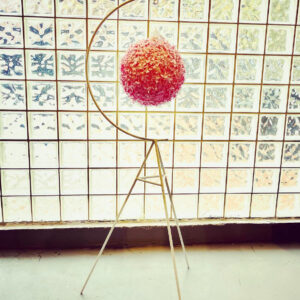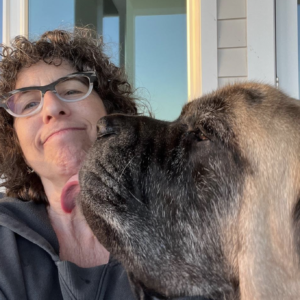Julianne Mahler
Julie Mahler started to think of herself as an artist late in life. This artistic phase of her life is a (another) new invention of herself (at 60+ years, she has had to re-invent herself several times). Julie’s first career was 32 years as a geologist in the oil and gas industry. She has travelled extensively, so her influences are quite global. Her family is at the heart of her reasons for being. Julie is a mother (and grandmother), a wife, a daughter, a sister.
Becoming an artist, like life itself, has been a journey for Julie. Art, craft, and handwork are an emotional outlet for her, but it has taken her a very long time to think of herself as an artist rather than one who ‘crafts’. The boundary between art and craft is one that Julie finds to be quite blurred. She can, however, define a singular moment that became a turning point in her journey.
On January 1st of 2019, She received news that forced her to accept that her ‘golden years’ were not going to be as she had planned them. Julie decided to fold 1000 origami cranes in that year as a form of meditation. And she chose to fold the cranes from the pink backing paper of feminine sanitary pads. The cranes are small and are all mounted on a single 18” X 24” canvas.
When she filled the surface of the canvas, she started building out and up by mounting the cranes on small wires. There are about three levels of cranes on the canvas to get all 1000 in this one piece. Mahler completed the piece in December of 2019 and call it ‘A Mother’s Prayers.’ During that journey folding 1000 origami cranes, she also started folding old books – first in abstract designs and then in more figurative patterns.
As a result of that year, her focus has become folded paper and deconstructed book art — the medium is endlessly fascinating for her. She continues to make mixed media collages of origami cranes or abstract book shapes, or both combined. She designs her own patterns for folded books. Julie has been known to soak her folded books in a super-saturated solution of Borax, which causes them to crystallize. She particularly focus on upcycling and repurposing – books, lunch bags, tea bags . . . the history of the material is integral to the art.
Overall, Julie’s themes tend to revolve around resilience, connections and community, and acceptance. Her and her husband actively lead a Jewish life and, for her, those elements of connection and community are rooted in her Jewish identity. Julie has learned that one cannot run away from, or hide, one’s identity. And She can’t pretend to be someone She is not. She is Jewish. and embraces that, now, and tries to represent that heritage in her artwork and in her social media and online presence.








